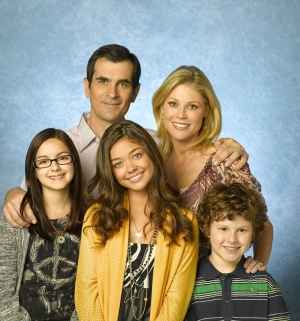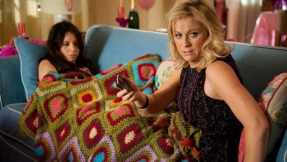The Mockumentary Sitcom: A Closer Look at Form

It’s been said that we’re living in a golden age of television. The past few years have seen harrowing dramas, clever cartoons, and fresh takes on comedy gracing the silver screen. The sitcom genre in particular has been re-energized by a “new” format: the mockumentary.
In truth, the mockumentary style, a form of fiction that appropriates nonfiction conventions that are hallmarks of documentary, appeared a long time ago in mediums that preceded television. For instance, the famous War of the Worlds broadcast, during which narrator Orson Welles used a series of fake news bulletins to suggest that an alien invasion was happening, could be considered one of the first mockumentaries. In this instance, the format was described as “cruelly deceptive.” The term became popular in the mid-1980s when Rob Reiner, the director of This Is Spinal Tap, used it to describe his film about a popular English band going on tour. Today, the mockumentary has found a comfortable place in comedy television. The most notable are American sitcoms such as The Office, Parks and Recreation, and Modern Family, which will serve as the primary focus of this article.
These shows function as intersections between the real and the unreal as they effectively parody documentaries. They play with the boundary between fact and fiction by looking and “feeling” real, but occasionally flagging themselves as fictional. They are also wildly successful. The Office has appeared on several top TV series lists and has been hailed as having one of the best casts on TV. The second season of Parks and Rec was called the most impressive comeback in TV history, and in 2012, Time Magazine named Parks and Rec the #1 TV series of the year. Modern Family has won 18 Primetime Emmy Awards and is praised for its realistic depictions of family life.
Why do American audiences and critics alike love mockumentaries? What is it about talking heads, casual dialogue, and improvised scenes that capture our attention and garner such critical praise? After all, the premises of these popular mockumentaries seem underwhelming on paper. The Office revolves around the everyday lives of office employees in the Scranton, Pennsylvania branch of the Dunder Mifflin Paper Company. Parks and Rec follows Leslie Knope and other employees of the Parks and Recreation department in Pawnee, Indiana, and their main objective is to build a park in an abandoned lot in town. Modern Family focuses on three families living in the Los Angeles area, who are interrelated through Jay Pritchett and his children, Claire and Mitchell.

These plotlines don’t revolve around life or death conflicts, lifestyles of the rich and famous, risqué scandals, or glamorous locations. Instead, it’s the social dynamics of a 9 to 5, life in a small town, or the day-to-day lives of middle-class families. And that’s precisely why they work. We see exaggerated versions of ourselves in these shows: our socially awkward or over-eager bosses (Michael Scott and Leslie Knope), our slacking coworkers (April Ludgate), the office romance that everyone gossips about (Jim Halpert and Pam Beasley), our self-proclaimed “cool dad” (Phil Dunphey), and our ditzy sister (Hayley Dunphey).
Furthermore, these mockumentaries have a “feel good” nature. Many popular shows focus on characters facing serious, stressful, high-risk situations. But these successful mockumentaries are good at heart: characters struggle and face hardship, but the general tone is positive. Trials are low stakes and typically resolved easily. They are reminiscent of our real lives, focusing on both the everyday ups and downs and typical milestones: getting married, having kids and raising them, going to work, and connecting with family and friends. It’s both relaxing and reassuring to see the characters we love experiencing the same things that we do. We cheer when Leslie and Ben Wyatt finally tie the knot, we laugh when Jim pulls endless pranks on Dwight Schrute, we feel proud when Hayley’s family celebrates that she was waitlisted at college. It’s as though we’re living our lives right alongside the characters.

Mockumentaries also have a “natural” feel that helps viewers to relate to the action and characters. There is no laugh track on The Office, Parks and Rec, or Modern Family, so we are not constantly reminded that they are fictional. The characters’ speech typically comes across as unscripted due to casual and occasionally awkward dialogue. Improvised scenes also add to the “real” feeling of a documentary: although the scripts are often brilliant on their own, actors such as Ty Burrell and Amy Poehler have said that sometimes, cast members will come up with hilarious lines on the spot. The format itself causes the subject to become even funnier. Even though what’s happening on screen may seem absurd, it is framed by the “rational” perspective of a documentary. This allows us to see just how ridiculous and silly the things we deal with in real life can be.
The humor of these mockumentaries can be heavily influenced by social, pop culture, and political commentary. The characters on Parks and Rec love Game of Thrones, and Dunder Mifflin’s employees make countless Harry Potter references. Furthermore, current political issues can sometimes be front and center. On Modern Family, Mitchell Pritchett and Cam Tucker are a gay couple, and many viewers feel this representation is important at a time when gay marriage is still a hotly debated issue. These cultural and political references serve two purposes. We feel like we’re in on the joke, and we exist in the same universe as our favorite characters. We watch the same shows, read the same books, and listen to the same music. It’s also gratifying to see these characters equally frustrated with societal issues.
The success of the mockumentary will most likely persist. Few sitcoms currently use the format, but those that do are clearly regarded as high quality television. The style has entertained audiences and critics through various mediums for decades, and many have recognized its importance. It has already changed the sitcom genre and has firmly established its value as a medium for satiric storytelling that audiences easily connect to.
What do you think? Leave a comment.










An enlightening article. I am a huge The Office fan, myself, and I have seen my fair share of Modern Family and Parks and Recreation sporadically. I definitely agree with you that the man focus of this particular medium is viewer inclusion in the world of the show. We are meant to feel like these people could be our coworkers, neighbors, etc. The overall effect is that our expectations are lowered to the surprises that come when these characters get themselves into extremely comedic situations. I have never watched an Office episode that has not made me laugh out loud, no matter how many times I have seen it previously.
As a side note, I think this effect translates well to other forms of empathy for the show. I was a huge fan of the Jim and Pam romance, and my concern for their relationship kept me watching the show during the final season.
*main focus
Jim was a great character; Pam, not so much.
Great analysis Jane. I never really gave Modern Family a chance, but if you think it is in the same general category as The Office and Parks and Rec, then I might just have to give it a try.
The mockumentary style gives the audience a chance hear the character’s actual opinions, rather than assuming them, like in a regular sitcom. That’s why people love these kinds of shows: revealing underlying intentions is hilarious.
Pretty much every show that uses the format is still far better than any single reality show.
I didn’t realize Modern Family was a mockumentary, I just thought they were so weirdly vain that they occasionally talk they are being interviewed.
Very funny. I kind of want to believe this also.
Great article. If you haven’t already I would suggest watching the original BBC Office with Ricky Gervais.
Trailer Park Boys was killing it way back before most of these. And I love Parks & Rec. Way more than The Office.
If it’s done right it delivers the best shows on tv but you can’t get lazy and let the breaking the fourth wall do all the comedy. Shows like The Office, Modern Family and Parks and Rec are what its all about
My biggest pet peeve with Parks & Rec, which I otherwise love, is the mockumentary format. The only thing worse is the crime against humanity known as the laugh track.
As much as I like the mockumentary format, it is getting a bit tired.
I’m so glad to have read this piece; I’ve been trying to pinpoint why I enjoy comedic mockumentary TV shows more than standard formats. I think the absence of a laugh track really opens up the space where viewers can read humor into different situations. Certainly, there is still framing and a way of reading that are emphasized in the mockumentary format. For instance The Office makes it extremely difficult to identify with Angela Martin, the persnickety, self-righteous office cat lady. But, generally speaking, there are fewer cues for what is meant to be read as comedic. With this spike in mockumentary sitcoms changing the aesthetic terrain, older techniques, like a laugh track/live studio audience or a sound stage, look and feel older. I also think mockumentaries, despite being scripted or improvised, mockumentaries retain some of the feelings we get with documentaries. I’m not saying anyone is watching thinking this is true, but there’s a sense of authenticity. This authenticity, even if feigned, seems to allow room for comedic high notes as well as sentimental asides. I think Modern Family, The Office, and Parks and Rec all do this really well; you’ll be laughing and then kind of tear up (hopefully it’s not just me). I’m attributing a lot of this to the format and its associated elements, but perhaps there’s something else happening here. You’ve got me thinking!
Excellent analysis. I definitely wouldn’t have put Modern Family in this category but you’re right! I never saw it like that before. Fascinating piece!
As a fan of all three of these shows, I really enjoyed this piece! I’m shamed to say, but during middle school and high school I didn’t watch The Office. A semester away at school seemed to be the perfect time to binge watch the entire series, because I finally wanted to know how employees sitting around in an office could be THAT funny. Needless to say, I was hooked and I’m sure the mokumentary style had a lot to do with it for all the reasons you mentioned. When Jim looks at the camera with a half smile after pulling a prank Dwight, you do feel like you’re in on the joke.
The success of the mockumentary will most likely persist. Few sitcoms currently use the format, but those that do are clearly regarded as high quality television. The style has entertained audiences and critics through various mediums for decades, and many have recognized its importance. It has already changed the sitcom genre and has firmly established its value as a medium for satiric storytelling that audiences easily connect to.
Great article! I’m a fan of the Office and Parks and Rec and the mockumentary format is definitely one of the reasons they are/were so successful. I’ve Modern Family is hilarious but I haven’t watched it. I have to check it out now, knowing its a mockumentary.
While I really enjoy this kind of set up (mainly the BBC program The Thick of It), I really can’t stand the way that they are often shot. The constant zooms and pans just feel so weird, distracting, and disorienting at times. Thought the content is usually great, the way its presented just seems goofy sometimes. But perhaps that’s just another part of the joke.
I agree that the Thick Thick of It is amazing! I think that it takes a better style with the mockumentary by not having the talking heads. Although I’d be terrified to actually meet Malcolm Tucker!
Very well-written. I love this style of comedy simply because it feels so real, and definitely relatable to everyday life. The Office is one of my top 5 favorite shows of all time. It’s surprising to me, being a filmmaker myself, to find the “amateur” looking camera style so wildly entertaining, as I usually love carefully designed cinematography. For these shows, that style works so well because it makes me feel like I’m standing in the room next to the action. Thanks for the read.
Let’s not forget Brooklyn Nine Nine which takes a less direct mockumentary style—without the talking heads and less of the in-focus/out-of-focus camera style. It is a great show, everyone should watch it.
I love mockumentaries in general; and particularly the potential there is for satire. Interesting article!
Some great points here. I think Pam’s final words at the end of The Office series finale kind of sum it all up: “I think an ordinary paper company like Dunder-Mifflin was a great subject for a documentary. There’s a lot of beauty in ordinary things. Isn’t that kind of the point?” The mockumentary format, especially one as self-referential as The Office makes everyday situations and relationships completely absorbing.
That Pam quote is exactly what I was thinking!
Awesome article!
I am currently writing something similar as a genre theory piece and found this to be a really solid place to start my research. One influence that I think you overlook here is reality television. The mockumentary features a lot of the same stylistic choices in the reality TV genre and relies heavily on the private interviews where characters break the fourth wall and address the audience directly. I think that this stems directly from the use of a “confessional” in many reality shows. I think that more than anything, the mockumentary format is a way to revitalize the sitcom for audiences inundated with reality television and is essentially a hybrid of the two.
A very well written article, you made a lot of great points, I hadn’t consider their references to pop culture as a way to make audiences feel included. Although I enjoy it, I feel Modern Family plays very fast and loose with the mockumentary format, besides the talking heads there is little to place it in the genre, way too high production values. Not that I’m complaining, it’s a good show that is exploiting a popular mode of representation.
A very well written article, you made a lot of great points, I hadn’t considered their references to pop culture as a way to make audiences feel included. Although I enjoy it, I feel Modern Family plays very fast and loose with the mockumentary format, besides the talking heads there is little to place it in the genre, way too high production values. Not that I’m complaining, it’s a good show that is exploiting a popular mode of representation.
I am a huge fan of “The Office” and have recently started watching “Modern Family” I am a huge fan of both. I love the mockumentary style of sitcoms now. I think they are much more entertaining than the usual sitcom style such as “George Lopez”.
Wonderful article. Very insightful.
Well written article, its just a bit of a bother that I havent paid rent this week and just lost power.
From what I can tell, the Mockumentary form seems to have been a novelty of its age thus far.